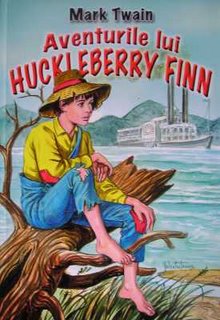 Written as a sequel to Tom Sawyer, The Adventures of Huckleberry Finn is the great literary leap forward on that original book. Nay, more than that, it would be better to call it a work of genius, as Mark Twain has created something entirely original.
Written as a sequel to Tom Sawyer, The Adventures of Huckleberry Finn is the great literary leap forward on that original book. Nay, more than that, it would be better to call it a work of genius, as Mark Twain has created something entirely original.The genius of the novel is in the language employed to narrate the story. It’s all written in the first person, related by Huck Finn himself. On the last page Huck says how glad he is to be done with writing his book: ‘…there ain’t nothing more to write about, and I’m rotten glad of it, because if I’d a knowed what a trouble it was to make a book I wouldn’t a tackled it and aint’t agoing to no more.’
The wonder of this book is how Mark Twain keeps up this local Missouri dialect for the entire 300 pages of the novel, making it so believable. There’s not a moment in the novel where the language seems forced on put on. As Harold Bloom says of Shakespeare’s great characters, Huckleberry Finn is a free agent of himself, a fully formed three dimensional character. Not once throughout the novel did I detect the author’s hand, trying to direct me this way or that. Rather I just enjoyed Huckleberry Finn’s retelling of events.
The story is pretty simple, and is for the most part a picaresque adventure, indeed as the title says. Huck Finn escapes his brutal father by faking his own death, then hooks up with Jim, his aunt’s slave, who has run away after overhearing a conversation where Miss Watson, his owner, says she is going to sell him down the river. Futhermore, he has been accused of killing Huck. So they are on the run together. Huck grows quite fond of Jim, and determines to help him escape. All comes out good in the end when Miss Watson dies and in her will sets Jim free. The bad news for Huckleberry Finn is that he now has another aunt determined to look after and civilise him – a fate worse than death.
Like in Mark Twain’s other books, innocence and experience are mixed in equal measure. Significant parts of the novel come across as being amoral, or at least wanting to wipe the current moral slate clean and start again. As mentioned above, the description of Huckleberry Finn’s father is quite extraordinary. Here is a truly bad man, a lousy bum who beats his son and is also trying to rob Huck out of his own money as well. Yet the way it is described you don’t judge the father, but laugh at Huck’s practical way of going about extracting himself out of these troubles.
Here’s Huck Finn talking about his father:
‘Pap he hadn’t been seen for more than a year, and that was comfortable for me; I didn’t want to see him no more. He used to always whale me when he was sober and could get his hands on me; thought I used to take to the woods most of the time when he was around. Well, about this time he was found in the river drowned, about twelve mile above town, so people said. They judged it was him, anyway; said this drowned man was just his size, and was ragged, and had uncommon long hair – which was all like pap – but they couldn’t make nothing out of the face, because it had been in the water so long it wasn’t much like a face at all.’
I wonder how America’s Christian right would take this book. The above mentioned scene would not go down too well. There’s also another scene in the book where Huck Finn determines to be bad. Deciding not to turn the slave Jim in (a crime in its day, as Jim would have been someone else’s property), Huck Finn weighs things up. If he’d done the right thing by society, he would have felt terrible for what he’d done to Jim. If he did the right thing by his own conscience, he’s damned by society. So he reasons he may as well turn as bad as can be. Surely the religious right would like to see this book banned.
Another controversial point about this novel is the language used to describe Jim, he’s quite frequently referred to as a ‘n*****’ (sorry folks, I don’t want to write that word on my blog). Plus there are all the other usual descriptions of people of colour from that era – weak, childish, effeminate. However unpalatable it might be to contemporary readers today, it gives a good illustration of attitudes in the days of American slavery. I have not read any bios or critical studies of Mark Twain or Huckleberry Finn, but am sure that these attitudes are not those of the author. Read Pudd’nhead Wilson if you want proof of that.
No wonder this is an American classic. A truly wild, strange, surreal and completely original book. Opening and reading this 121 year old novel, you could swear it was published only yesterday, so fresh and vivid is the language.
Pudd’nhead Wilson is still my favourite, but Huckleberry Finn has turned me into a Mark Twain fan. In these mad, crazy days, full of political lies, media lies and all round cultural garbage, Huckleberry Finn will restore a bit of sanity to your life.
A great American author who belongs to the world.
Related Web Experience links:
Tom Sawyer
Pudd'nhead Wilson
No comments:
Post a Comment